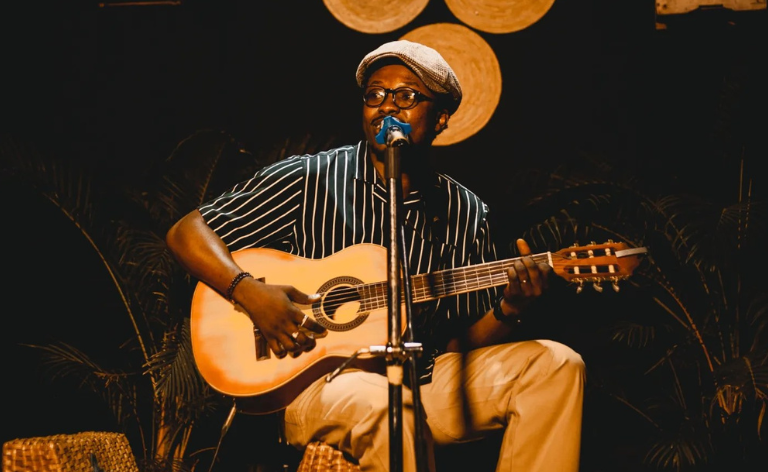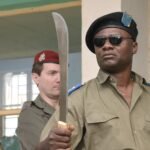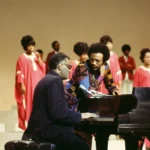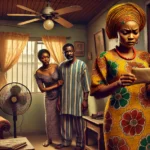AFRICA – Music, Arts, the Entertainment Industry and Society – Interview with Dr. Doug Kaze
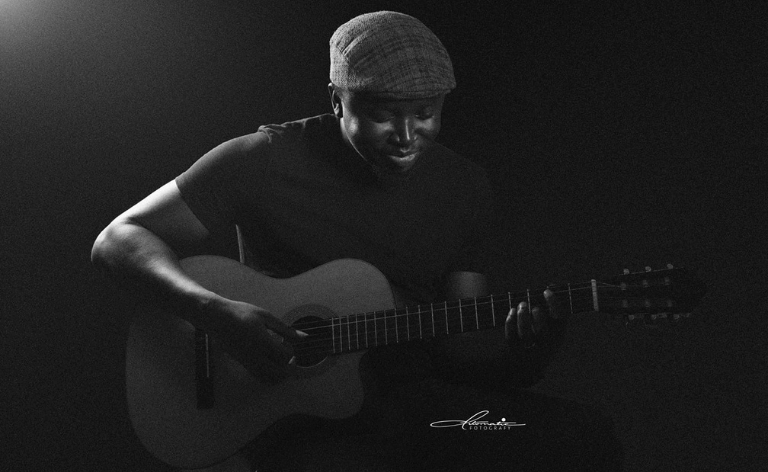
The arts and society are essential issues. Living is an art form in and of itself. One of the first things that man accomplished was to use his creative ability to make art. Archaeological discoveries will always show that when humans were still living in caves – practically everywhere in the world and independently of one another – they carved figures telling stories in the caverns. Music also came naturally to man, and people all around the world have their own music and arts – it’s in their DNA. Man has taken the arts seriously and with respect as he has progressed, but the same arts have also been abused. Today, in the twenty-first century, we have more forms of arts and entertainment than any previous generation – it’s as if we create on a daily basis. Art has produced beautiful designs such as aeroplanes, as well as dangerous (and sometimes beneficial) designs such as the AK 47. Music has inspired individuals to do good while sometimes encouraging rough and promiscuous behaviour. Poetry has generated timeless classics such as Shakespeare’s “Can I compare thee to a summer’s day” or Maya Angelo’s “Still I Rise,” yet it has also produced useless erotica. It’s easy to get mixed up between the arts and finding a balance in today’s environment. I had a lengthy but important interview with Dr. Doug Kaze, who has made considerable progress in both writing and music, educating Creative Writing at the University of Jos and continuing to perform music. Dr. Doug Kaze was able to make some crucial points about music and the arts, how well they have performed, and the role they serve. Have fun reading.
Hello, Doug Kaze. Please tell us a bit about yourself.
A bit about myself. I love creating and creativity, particularly in writing. I used to draw as a kid, and I’d write stories and songs. But the drawing later stopped – though I still play with the idea of returning, I don’t know. The two others have persisted. I think I was born with that love. I’m a product of the 90s, the generation that straddles the analogue and the digital, the typewriter and the computer, NITEL and GSM, CRT and LCD, cassette and CD, hahaha, you name it! I grew up in a Jos where Christians and Muslims lived together, and religious violence used to be one of the things we heard about distant places. I grew up in Nigeria where was afraid to talk because some military men in power would kill me if I did. I grew up at the time of the Gulf war when the Berlin Wall fell and when Nelson Mandela was released from jail. I’m a combination of different things, and then I’m very odd. I chose to study English when everyone was going for law. I chose to be a teacher when everyone went after high-paying jobs. My father never understood me. In addition to writing, music and research and teaching, I hope to make a movie one day. The future is a book no one has read – maybe I’d even be a politician.
A lecturer, writer and recording artist! How did you put all these together? Do your passions conflict or do you have a common goal for all three? Do you have a fourth career I didn’t mention?
It’s been a complex one for me, in fact. I actually started out wanting to be a rapper, a basketballer, a lawyer, a broadcaster, a writer, and a painter. Somehow, in the journey, some of the interests dominated the others. I discovered my passion for teaching when I was in university. I discovered I had the desire to simplify ideas for others. So I’d organise free English lessons at church. Music and writing, however, seem to be always there. I don’t see myself as one who has got it all together. I’m just a juggler, still fighting to organise my interests. I’ve tried to let go of some of them and focus on one, but I always return. Sometimes I work in seasons. So this could be the season of music; another time, writing. But the best method that has helped me to conquer these tensions has to do with how I think about these domains. I try to think of them not as contradictory, but as different aspects or faces of the same thing. As meaningless as that sounds, it has helped me in amazing ways not to feel divided within me. So things flow both naturally and consciously.
By classification you are a millennial – what have you noticed about art – music, writing, poetry, comedy, etc. in Nigeria from the 90’s to date?
Those days, you didn’t get to meet a musician, an actor or a writer every day. Those were distant figures whom we mostly met through their works. The 90s, though a troubled time in our history, was a period we cannot ignore when we discuss the development of the arts in this country. The period witnessed the birth of Nollywood, which I wish would have been named something else. It was also the period that bridged the second generation of Nigerian literature and the current generation. The bridging wasn’t an easy one. It was the season of what has come to be known as the Brain Drain. Intellectuals and creative writers had to leave the country because they didn’t feel safe there anymore.
In the 90s, those who “made it” in music were those in the more African genres of juju, fuji, afro-juju, and highlife. It was the day of Shina Peters, Sunny Ade, Ras Kimono, Majek Fashek, etc, those who grew up in the 70s and 80s. Somebody calls this the highlife generation. On the other hand, those who grew up in the hip-hop generation of the 90s couldn’t find mainstream acceptance because the industry thought their sounds were un-African. Change however came along with our move to democracy. In 2000, the sound of Nigerian music began to change into what we have today. Companies like Kennis came on board and took the younger generation with their new sound seriously and promoted them. That was, I think, the beginning of contemporary Nigerian music. Since then Nigerians have become comfortable hybridising elements from local and American music. In the 90s, rappers wanted to sound completely American! Nobody rapped in Hausa or in pidgin, except, of course, Junior and Pretty. But now it is different and normal to hear rap in local Nigerian languages or pidgin.
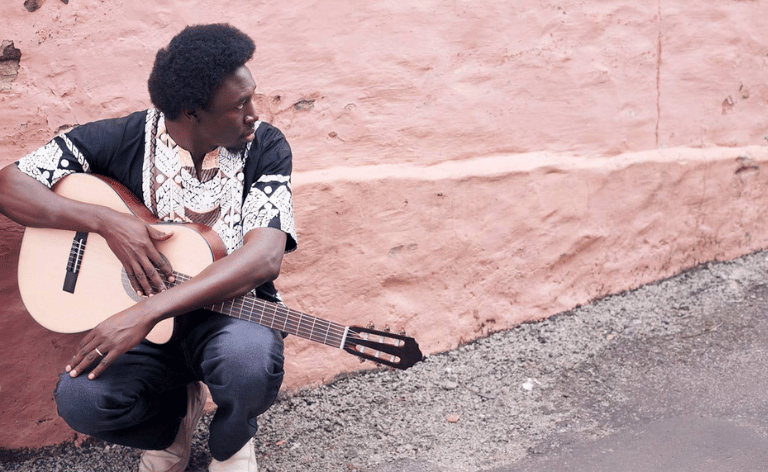
In the area of writing, the 90s was a tough period. Nothing much was being produced possibly due to the repressive atmosphere created by military rule. I think publishing companies also had their problems to deal with. After the year 2000, however, the explosion of contemporary Nigerian writing, famously called the third generation, began. Of course, Euro-American publishers and literary prizes from outside Africa did play a very important role in this explosion. The new indigenous publishers began to spring up to take their place in the revolution. In general, we can say the internet also played a very important role.
The US art community has been celebrated for producing art that edifies society and inspires good social change and behaviour an example is Michael Jackson: “Heal the World” and “We are the world”, in your experience have you seen such in Nigeria and even Africa as a whole?
Yes, African art has played an amazing role in dealing with social (and political) issues. Literature, for instance, did a lot for independence. In the early 1900s, African writers wrote poetry to challenge colonialism. In Anglophone West Africa, they wrote poor poetry but still made a statement on the colonial situation and left us with a creative record of early resistance to imperial domination. In those days, even Nnamdi Azikiwe wrote political poetry. In francophone West Africa, it was different in terms of style. In the days of negritude writing, the French-speaking African poets wrote better poetry and used that to also challenge colonialism and promote a sense of pride in being African, as that identity was becoming a problem.
After independence, writers continued to write for society, challenging poor and dictatorial leadership, which became the norm in most newly independent African countries. A lot of writers across Africa went to prison in the 70s and 80s for playing the gadfly. Fela Kuti is an example of what we’re talking about. He is famous for using his art to challenge the abuse of power by the military regimes of the 80s and 90s and to speak for the Nigerian masses. There were other musicians who did this too, especially those in the reggae genre. Obviously, they were inspired by the resistant message of the Jamaican reggae movement. The release of Nelson Mandela from 27 years of imprisonment is another example where the arts in Africa played an amazing role. I knew about apartheid as a child in the 90s through Nigerian music.
So yes, Africans have produced music or art with social and political messages, which have resulted, to a very large extent, in the desired change. We still have artists who produce socially-conscious music, but they seem to be overshadowed by those who make songs that inspire harmful decisions among young people. Of course, artists should be free to write and perform songs about any subject of their interest, and this isn’t necessarily in defence of didacticism. But when creative freedom isn’t accompanied by wisdom and a sense of responsibility, it becomes a disaster. We’re deliberately disconnecting cultural productions that glorify drug abuse, irresponsible sexual behaviour, objectification of women’s bodies and the get-rich-quick culture with the rise in sexual assault, depression and suicide, skin bleaching, girls struggling to accept their body types, teenage pregnancy, etc. I know entertainment is not the sole factor responsible for these, but lyrics and images play a strong role in forming attitudes and cultures, and vice versa.
It would be unfair to say the art community in Africa hasn’t produced good music for society but it appears those songs undersell as compared to Afro-pop, what would you label as the reason for this?
Most people think it is because of strong rhythms and certain kinds of lyrics. Maybe, maybe not. But contrary to the claim by most artists that they are simply giving the people what they want, the artists (and their labels and marketers) are actually the ones shaping the consumers’ tastes. Alaba, for instance, created what has become afro-pop. They imagined that all the Nigerian wants is to dance and began to push songs they imagined would satisfy this assumed need. To them, the Nigerian isn’t interested in music that provokes thinking, even though lots and lots of Nigerians listen to imported lyrics-based music. “Danceability” became the single most important criterion in getting a marketing deal. You can say anything, but just give us the beats! So a lot of artists started dumping their original sounds in order to ape what those who have become famous in this genre are doing. But the success of every song relies mostly on promotion. This genre of music has been forced on the Nigerian consumer through repeated play on TV and radio and in public spaces like motor parks, open markets, taxis and buses. The Nigerian has not been given options by those who control the circulation of songs. I hardly watch music channels, for instance. It’s always the same faces, the same sound, the same recycled lyrics, the same voice effects, and the same video ideas (half-clad slim fair ladies have to feature). I’m not saying the afro-pop sound is all bad in itself, but its domination of the market isn’t a result of artistic merit, but the big promotion machine.
Writers are almost Saints when it comes to inspiring social change or producing “good art”. Can you tell us some of the most excellent books you’ve read from Africa in the last 15-20 years and why you love them?
Wow, that’s a tough one. I’ve read a lot of great books over the years. I enjoyed Arrow of God and Achebe’s handling of the interesting character of Ezeulu, who isn’t like Okwonkwo in many ways, and the complex relationship between a single man, a community and their gods. I find it to be more sophisticated than the celebrated Things Fall Apart. One of my most memorable books is The Beautyful Ones Not Yet Born. My first encounter with the book wasn’t a pleasant one because of the strong filthy images that fill the book. But after reading it the second time I fell in love with the artistry in that book – never mind that Achebe thought there was nothing African about the novel. Armah’s word power draws you into his fictional world and brings all your senses to life. Diana Evans’ 26a is an amazing book about twoness, growing up and trauma. I love the way the ordinary turns magical in that story. I also love Aminatta Forna’s novel The Hired Man. Fortuna, a Sierra Leonean writer, writes with a certain kind of precision and reticence that I admire. She is not in a hurry to give you everything. She lets the story unfold slowly and surprises you as you go on. By the way, that’s a Croatian story told by an African writer. Purists might say that’s not an African novel. I love other books like Habila’s Waiting for an Angel, Dul Johnson’s Deeper into the Night, Sule’s Sterile Skies, Abidemi Sanusi’s Eyo (which inspired one of the songs in my second album), for their amazing artistry and handling of issues in contemporary Nigeria. Also, I respect the amount of research that went into the making of Adichie’s Half of a Yellow Sun.
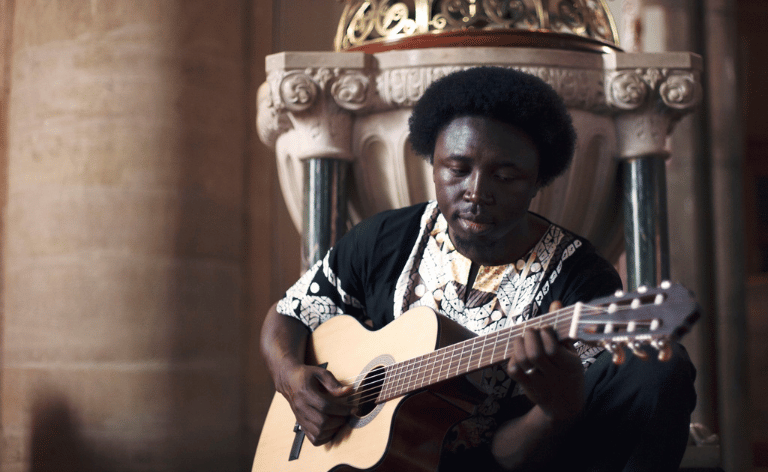
Jos where you hail from is celebrated as the base of art in Nigeria, what about the town and its environment do you think is the reason for that?
Well, Jos is blessed with loads and loads of artistic talents and it’s hard to pin that down to a particular factor. We do not have a richer cultural heritage than other cities, or maybe our very cosmopolitan population is a factor. Is it the geography, the altitude? A plateau means an elevation. Do people who live in elevated areas get to harvest more talent? I really don’t know. But I’m sure being a small city made it possible for the arts to grow and circulate easily and contagiously among residents in Jos and surrounding towns. But it’s not even all the arts. Jos is known more for music than any other art form. Of course, the early success of the theatre arts department of the university was also quite remarkable, playing an important part in the birth of what they call Nollywood. Unfortunately, apart from amateur church efforts, the theatre has not effectively spilt from the campus into the public sphere in Jos. At the moment, only the Jos Repertory Theatre has been consistently active, while many young people roam our streets with theatre arts degrees. Jos is also doing well right now in the spoken word movement. We have amazing, amazing talents there, and these poets are doing well creating performance platforms for themselves. We also have some of the greatest photographers here. However, in general, I’d like to say, Jos is just a home to raw talents, potential. We’re yet to transcend that in a significant way. We don’t seem to know what to do with these gifts.
What do you think is the performance of the Nigerian entertainment industry in general and how do you think it could do better?
In general, the Nigerian entertainment industry has done well. Production standards have improved and promotion outlets such as television, radio and the internet have been helpful. But the industry is mainly located in Lagos, other places such as Jos need to develop their own industries. Jos is a place of raw talents. It is where you find great talents, but that is all. There are missing links in the ecosystem between the artist and the consumer. In the ecosystem of the industry, there needs to be between the talent and the consumer functioning record labels, effective marketers or marketing networks, and event promoters, in short, the machinery that makes the product conveniently available to the fans and productively draws revenue from the consumers for creators. That circulation of funds is what makes the industry. Another thing that the Nigerian industry needs to overcome is piracy and licensing issues. There need to be structures that take care of these leakages. People are beginning to believe that physical formats, CDs, that is, don’t sell now and have turned to digital formats. But why do we still have pirates selling CDs? Some people are still making money from CDs they have reproduced illegally while the creators are losing. The practice of peer-to-peer file-sharing also needs to be discouraged. That is one of the disadvantages of digital era.
What do you think Artists, writers, comedians and other Artists could do better in terms of influencing society for good?
Over-commercialization of the arts has really fought that aspect of the arts. I’m not saying all arts should be openly didactic, but there are values that our entertainment promotes that are harmful to young people. Our music, for instance, does not help young people who need to make responsible choices in the area of sex and sexuality. I’ve repeatedly said that our entertainment promotes the objectification of women – women as nothing more than bodies to be exploited.
What is your take on some recent Nigerian music like Falz’s: “Child of the World”, “This is Nigeria” and Patoranking’s “Heal the World”? What is your advice and encouragement to these artists and others?
Yeah, I like the bold role of artist-as-prophet that Falz is beginning to step into. I do not know Patoranking’s music though. I think it is a worthy path that should be pursued.
A good artist that you are, Do you and your counterparts have any plans in place on how to raise another generation of writers and musicians?
I don’t consider myself to be where I ought to be. But I desire to do my bit in influencing the arts. I teach creative writing at the university and that is a platform to influence the next generation of writers. It’s exciting to do this. I also do songwriting workshops for young artists. I’m not much of a guitarist, but I’ve done my bit in teaching guitar to younger people. Today some of them have become maestros that I wish to learn from. My biggest burden now is to create platforms, no matter how small, for young artists and be part of closing the gaps in our broken music ecosystem.
Can you also recommend some of your own work?
All my music is available online. Listeners can buy downloads or stream from Apple Music, Spotify etc.
Any parting words for our readers?
Don’t abandon the little things, but don’t aim to remain little.
Dr. Doug Kaze has given plenty of food for thought to artists whether writers, musicians, poets, etc. and aspiring artists as well as the stakeholders in the entertainment industry. Will we focus on making the entertainment industry it is best doing well and inspiring a better Nigeria and world? That’s left to everyone reading.
To say much again about the arts and entertainment industry in today’s world and Nigeria will be too much for one day.
I will write again about music and the arts and entertainment hopefully with another interview from another artist. However, you can check out other great creatives that have featured in Sarauta Spotlight here

